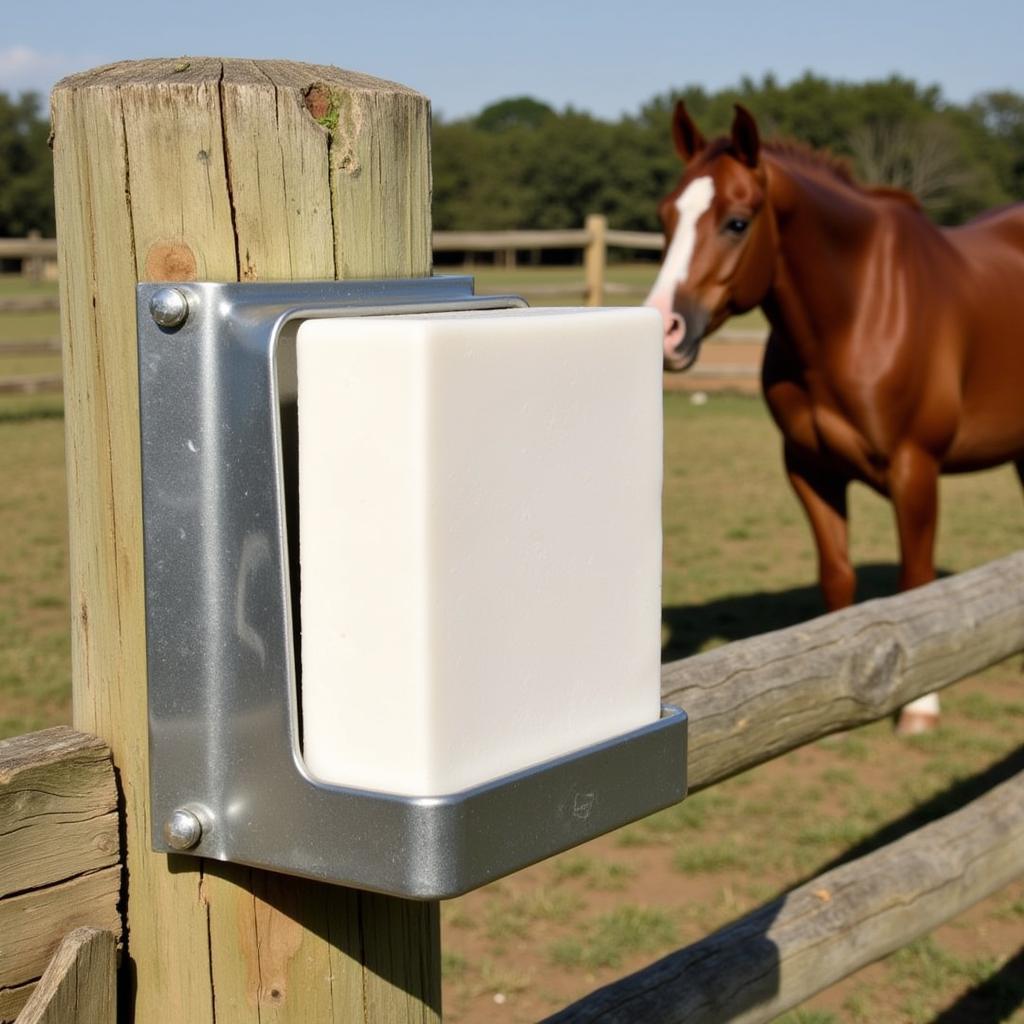Salt licks for horses are essential for maintaining their overall health and well-being. Horses, like all mammals, need a certain amount of salt in their diet to maintain proper bodily functions. But why are salt licks so important, and how can you be sure your horse is getting the right amount?
Why Salt Licks are Essential for Your Horse
Salt, or sodium chloride, is a vital mineral that plays a crucial role in various physiological processes in horses. Here’s why your equine companion needs a salt lick:
- Fluid Balance: Salt helps regulate the balance of fluids in your horse’s body, ensuring proper hydration.
- Muscle & Nerve Function: Sodium and chloride are electrolytes that are critical for healthy muscle contractions and nerve impulse transmission.
- Digestion: Salt aids in the production of hydrochloric acid in the stomach, which is essential for digestion and nutrient absorption.
Different Types of Salt Licks for Horses
When it comes to choosing the right salt lick for your horse, you have several options, each with its pros and cons:
1. White Salt Licks:
- What they are: These are your most basic salt licks, made from pure, granulated salt that’s been compressed into a block.
- Pros: Affordable, readily available.
- Cons: Can be less palatable to some horses due to their strong salty taste.
2. Mineral Salt Licks:
- What they are: In addition to salt, these blocks are fortified with essential minerals like calcium, magnesium, and zinc.
- Pros: Provide a more balanced mineral intake, especially for horses on forage-based diets.
- Cons: Can be more expensive, horses may not consume enough to meet their mineral needs if they don’t like the taste.
3. Himalayan Salt Licks:
- What they are: These pink-hued blocks are mined from the Himalayan mountains and contain trace minerals.
- Pros: Considered more palatable by some horse owners, may offer additional health benefits from trace minerals.
- Cons: More expensive than white salt licks, trace mineral content is often very small.
How to Choose the Right Salt Lick for Your Horse
Selecting the best salt lick for your horse depends on a few factors:
- Diet: If your horse is primarily on pasture, a mineral salt lick can help supplement their diet. Horses on commercially balanced feed may need only a plain white salt lick.
- Health Conditions: Consult your veterinarian if your horse has any health conditions that might affect mineral absorption.
- Preference: Some horses are picky eaters! If your horse ignores one type of salt lick, experiment with others to find one they like.
How to Provide a Salt Lick to Your Horse
- Location, Location, Location: Place the salt lick in an accessible and convenient spot for your horse, like their stall, pasture, or near their feeder horse.
- Securely Mounted: Use a holder specifically designed for salt licks to prevent it from becoming a toy or a hazard in your horse’s environment.
- Fresh Water is Key: Always ensure your horse has access to plenty of fresh, clean water, especially when they have access to a salt lick.
 Horse Salt Lick Holder
Horse Salt Lick Holder
FAQs About Salt Licks for Horses
1. How much salt does a horse need per day?
On average, a healthy adult horse needs about two ounces of salt per day.
2. Can horses have too much salt?
While rare, horses can consume too much salt, which can lead to salt toxicity. Signs of salt toxicity include excessive thirst, urination, and even neurological problems. Always provide fresh water and monitor your horse’s salt intake.
3. My horse doesn’t seem interested in their salt lick. What should I do?
Try different types of salt licks, or offer loose salt mixed in with their feed. Consult your veterinarian to rule out any underlying health conditions.
Need More Help With Your Horse?
Contact Justus Horses USA at 0772127271 or [email protected]. We’re available 24/7 to answer your questions. You can also visit us at QGM2+WX2, Vị Trung, Vị Thuỷ, Hậu Giang, Việt Nam.
For additional resources, check out our other articles:
At Justus Horses USA, we are dedicated to helping you provide the best possible care for your equine companion.